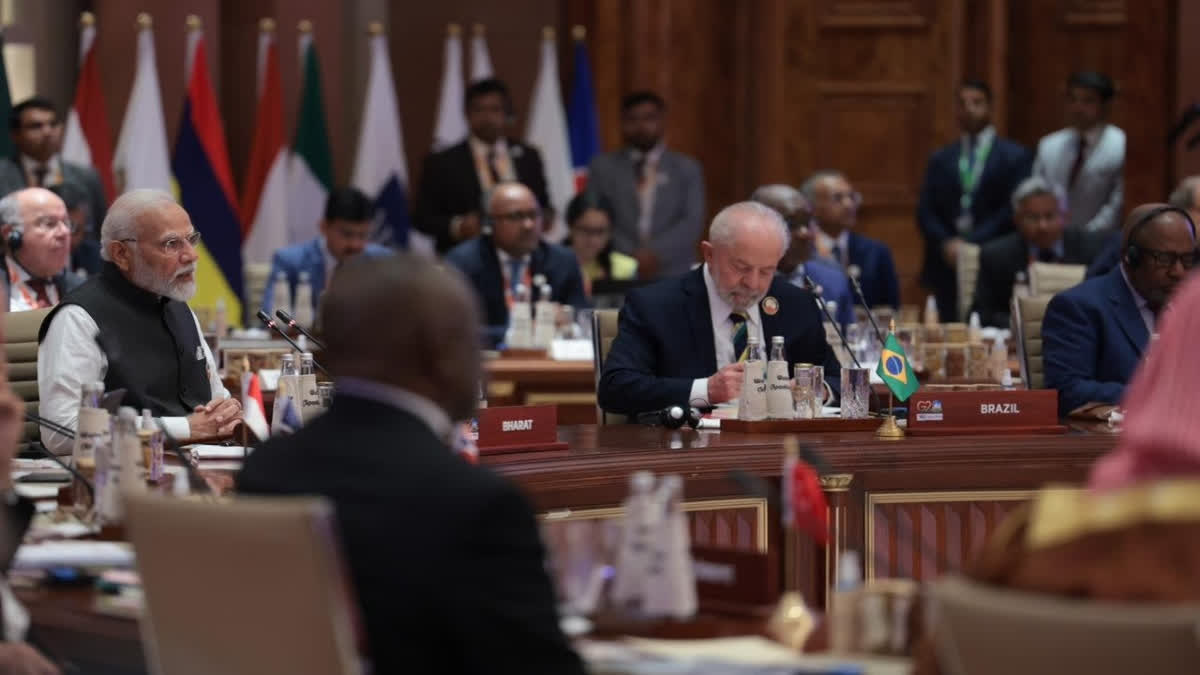New Delhi: The G20 Summit, held in New Delhi, has entered its second day of deliberations, marked by significant strides towards addressing the "global trust deficit," climate change, and complex economic issues. Leaders from across the world have gathered with a renewed commitment to forging a path toward a more sustainable and equitable global future.
Day Two Agenda: PM Modi's Leadership
On this pivotal day, Prime Minister Narendra Modi takes the reins to chair the third session of the Summit, titled 'One Future,' hosted at the majestic Bharat Mandapam. The world is watching closely as PM Modi orchestrates discussions on vital global matters.
PM Modi's diplomatic engagements are also in the spotlight, as he is set to hold meetings with French President Macron and engage in a pull-aside meeting with Canadian leaders. These interactions are expected to deepen diplomatic ties and foster cooperation on mutual concerns.
Also read: G20 leaders for inclusive growth, flag $4 trillion a year needed for clean energy tech
Furthermore, bilateral meetings between PM Modi and leaders from Comoros, Türkiye, UAE, South Korea, the European Union, the European Commission, Brazil, and Nigeria promise to catalyze collaborative initiatives that transcend borders and cultures.
Day One Highlights: A Pledge to Bridge the Trust Deficit and More
The opening day of the G20 Summit was marked by several landmark announcements. Foremost among them was the commitment to address the pressing issue of the "global trust deficit," an acknowledgement of the erosion of trust between nations in recent years. Leaders recognized the importance of rebuilding trust to ensure effective global cooperation.
Another significant development was the launch of the Global Biofuel Alliance, a cooperative initiative aimed at harnessing the potential of biofuels to mitigate climate change and reduce dependence on fossil fuels.
Additionally, new connectivity networks were inaugurated, strengthening the bonds between the United States, India, Saudi Arabia, and Gulf states. These networks are expected to facilitate smoother trade, technological exchanges, and collaborative efforts in various fields.
Delhi Declaration: A Unified Call for Peace and Stability
The G20 members came together in unity to unanimously adopt the Delhi Declaration, a document that carries a resounding message on the need to uphold territorial integrity and international humanitarian law to safeguard global peace and stability. The declaration underscored the commitment to international law, sovereignty, and the multilateral system.
Of note, China and Russia, whose leaders were absent from the Summit, expressed their agreement with the Delhi Declaration. However, the declaration did not explicitly condemn Russia for its involvement in the conflict in Ukraine, drawing criticism from Ukraine's foreign ministry, which noted that a Ukrainian presence at the Summit could have provided deeper insights into the situation.
Renewable Energy Commitment and Fossil Fuel Subsidy Pledge
In a significant step towards combating climate change, the G20 pledged to work towards tripling global renewable energy capacity by 2030. This ambitious goal reflects a collective effort to transition towards cleaner and more sustainable energy sources.
While the bloc did not commit to a complete phase-out of all polluting fossil fuels, including oil and gas, it did express its intention to expedite efforts to phase down coal power, aligning with individual nations' circumstances. The G20 reiterated its 2009 promise, made in Pittsburgh, to eliminate and rationalize inefficient fossil fuel subsidies, marking a step toward cleaner energy policies.
The African Union Joins as a Permanent Member
In a historic move, the African Union was officially inducted as the new permanent member of the G20. This decision signals a shift in the global power balance, offering developing nations a stronger voice and greater representation in shaping global policies and decisions.
Homage to Mahatma Gandhi: A Symbol of Peace and Nonviolence
Prior to the commencement of the day's sessions, Summit delegates paid a solemn visit to Rajghat, Mahatma Gandhi's memorial in Delhi. This symbolic gesture reaffirms the commitment of world leaders to the principles of peace, nonviolence, and social justice, ideals that continue to resonate on the global stage.
As the G20 Summit progresses into its second day, the world looks on with anticipation, hopeful that the deliberations and agreements reached here will lead to a more united, equitable, and sustainable global future. The challenges are immense, but the determination of world leaders to address them remains unwavering.
Leaders to leave after the Summit
Most Heads of State, including US President Joe Biden and UK Prime Minister Rishi Sunak, are scheduled to leave Delhi after the Summit.



